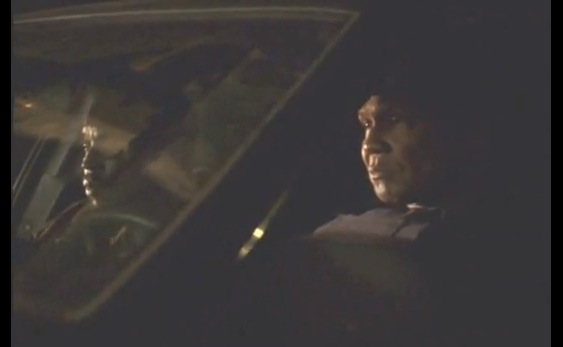Larry Donnell Andrews was in prison serving a murder sentence (for which he turned himself in) when The Wire, featuring the character Omar Little based on his life, first aired. Donnie died after an aortic dissection last week. Few who only knew about his life from its fictional depiction would have guessed that the 'real' Omar Little would live twice as long as the fictional one.
Magazine and newspaper profiles flatten the life of their subject, speeding up certain parts and slowing down others in order to fit a manicured narrative. Despite that tendency, Donnie Andrews' life—in print and onscreen fictionalization—reads like a composite of several different lives, enlarged and textured by seeming extremes. Redemption and mercy play supporting roles.
Donnie's childhood beginnings in North Carolina formed the background to the first dead body he saw at age four. It was a black man lynched and hanging from a tree. At age nine he and his brother witnessed a man murdered in a laundromat over fifteen cents. He has addressed the question of black vulnerability in the United States with full recognition of historic unjustness, exploitation, and inequity. Of his life in Baltimore he said, 'You don’t count money, you count time. Everyone out there is a walking dead man. We can’t rely on the police when we need ‘em. They just come to take the bodies away.' David Simon, whatever one's opinion of his editorializing of his show, told The Baltimore Sun: 'On paper, he’s a murderer. We’ve constructed a criminal justice system that doesn’t allow for the idea of redemption, and Donnie puts a lie to that.'
I met Donnie two years ago when he joined the cast of The Wire highlighting Charles Ogletree’s law school course on systemic inequality. He was the least impressed with the show, which he half-soberly, half-playfully called ‘watered down.’ On Omar leaping out from the fifth-story ledge of a building (Donnie jumped from the balcony of the Murphy Homes public housing project in West Baltimore), he told The Independent: 'That really happened to me, but I had to jump out of the sixth floor. It was either lead poisoning or take my chances, so I took my chances. I did it without thinking. If I'd thought about it, I might have taken the lead poisoning.'
Around the time we met I had been researching fictional criminals in Brazilian cinema, particularly during the military regime when the visualizing of redemptive violence (in distinction to the racialized depictions that accompanied electoral democracy) was a powerful force in film. Rogério Sganzerla's The Red-Light Bandit (1968) was based on the real-life João Acácio Pereira da Costa who robbed the homes of the rich with a red lantern. Though Sganzerla's film took great liberties with fictionalizing that life, the bandit code of 'civilians' or 'citizens' being left unharmed applied as much to fiction as real-life. Pereira da Costa's larger-than-life biography made for a riotous film (which didn't show him serving 30 years in prison) but left open the possibility for atonement and redemption despite the choices made under nearly insurmountable odds.
If I can be allowed the indulgence of crossing the boundary of Donnie's real life similarly, The Wire's most illustrative segments on honor codes came across in exchanges between Omar and police detective Bunk Moreland. In the first season of the show ('One Arrest,' 1.7), Omar acknowledges there is one.
Bunk Moreland: So, you're my eyeball witness, huh? [Omar nods] So, why'd you step up on this?
Omar: Bird triflin', basically. Kill an everyday workin' man and all. I mean, I do some dirt, too, but I ain't never put my gun on nobody that wasn't in the game.
Bunk: A man must have a code.
Omar: Oh, no doubt.
Three seasons later ('Unto Others,' 4.7), Omar repeats Bunk's summation of him: 'A man gotta have a code.' As in the image of Michael K. Williams (playing Donnie) sitting with Donnie himself in the still above above, Donnie was always in the presence of many mirrors of himself.
Omar Little, an outlying thief who robbed drug dealers, was endowed with a moral complexity seldom seen on television (and The Wire was not just television: it is to this day one of the few series set in a predominantly black city without drawing sensationalized attention to that fact). If Omar was ‘one of TV’s greatest characters’ it was because of Donnie. The show distinguished itself by laying out a palimpsest of failed American institutions but even within that decentralized narrative Omar was singular because the outcome of his life, before, during, and after incarceration was so unusual. He harnessed his dwindling resources to transform his own and others' lives. This country's prison-industrial complex is so brutal and efficient at marginalizing black men that his survival and gift of sharing that survival are truly extraordinary. Simon: 'The prison system in America isn't structured for rehabilitation. It's structured for warehousing. I believe in the individual's capacity to change their own future. Systemically, though, we sure make it hard. It's a pretty lonesome journey.'
Donnie was married to Fran Boyd, a remarkable person in her own right (and a protagonist in Ed Burns’ The Corner). The New York Times profiled Donnie and Fran's four-year courtship, mainly comprised of conversation and letters as Donnie was behind bars. They met in person several years later. (Simon called her his only hero: ‘Woody Guthrie and Fran, I guess—and I’m not so sure about Woody.’) Donnie and Fran raised at least four children together, his stepson and three of his Fran Boyd’s nieces and nephews.
